#Premenstrual Syndrome Anxiety
Text
Premenstrual Syndrome (PMS) – Causes, Symptoms, Diagnosis & Treatment

Dr. N. Romita Devi
Fellow Infertility Specialist
Dr. Deepak Goenka
Director, Institute of Human Reproduction
IVF Specialist
What is Premenstrual Syndrome (PMS)?
PMS stands for Premenstrual Syndrome. The physical or mood changes a woman goes through every month before menstruation which affects a woman’s normal life is called premenstrual syndrome (PMS). PMS has been reported in 30-40% of the reproductive female population.
What changes do we notice in PMS?
During PMS, a woman may undergo emotional changes such as:
Depression
Angry outbursts
Irritability
Crying spells
Anxiety
Confusion
Social withdrawal
Poor concentration
Insomnia
Increased nap-taking
Changes in sexual desire.
To read more, Click Here
Consult the best IVF Experts click here — Best IVF center in Guwahati, Best IVF center in Kolkata
#Causes Of Premenstrual Syndrome#Home Remedies For Premenstrual Syndrome#Pre-Menstrual Syndrome#Premenstrual#Premenstrual Dysphoric Disorder#Premenstrual Symptoms#Premenstrual Syndrome#Premenstrual Syndrome (Disease Or Medical Condition)#Premenstrual Syndrome Anxiety#Premenstrual Syndrome Hindi#Premenstrual Syndrome Signs And Symptoms#Premenstrual Syndrome Symptoms#Premenstrual Syndrome Treatment#What Is Premenstrual Syndrome - Signs & Symptoms
0 notes
Text
My day so far
Wake up with headache
Mind blowing* orgasm
Food
Ugly cry with big emotions for 2hrs
Play Taylor Swift music
Sit in sadness and feel all feels
Feel a little better
Chocolate
Start period
Say “oooohkay, yeah, that checks out”
Dance to more Taylor Swift
*dramatic effect, mediocre at best
#taylorswift#depression#anxiety#brain fog#mentalhealthawareness#mental health#depression working overtime#premenstrual syndrome#insecurities#insignificant#worthless#inadequate#mental health stigma#trauma survivor#healing is not linear#Taylor Swift music makes me feel things#dr taylor swift#therapy sessions with Dr Taylor Swift#music therapy#@taylorswift13#give me back my girlhood it was mine first#Spotify
2 notes
·
View notes
Text
Expert View On What Is Premenstrual Syndrome?
Premenstrual Syndrome (PMS) is a group of symptoms that many women experience in the days leading up to their period. Symptoms can include mood swings, fatigue, acne, bloating, and cramps. The cause of PMS is unknown, but it's thought to be related to changes in hormone levels throughout the menstrual cycle. There is no cure for PMS, but there are some treatments that can help lessen its symptoms. For example, avoiding caffeine and alcohol can help reduce fatigue and bloating. Acne can be treated with over-the-counter medications or prescription medications. And cramps can be treated with over-the-counter medications like ibuprofen or prescription medications like birth control pills.
#Premenstrual Syndrome#mood swings#feelings of bloating#breast tenderness#irritability#anxiety#depression#fatigue#bloating#and weight gain
0 notes
Text
Herbal tea basics -
Herbal teas can help with a wide range of health issues, depending on the type of tea and the specific properties of the herbs used.
Here are a few examples:
Digestive issues: Ginger, peppermint, and chamomile tea can help soothe an upset stomach, relieve bloating, and aid digestion.
Anxiety & stress: Chamomile, lavender, and lemon balm tea are known for their calming and relaxing properties, and can help reduce feelings of anxiety and stress.
Insomnia: Valerian root, passionflower, and chamomile tea can help promote relaxation and improve sleep quality, making them useful for treating insomnia.
Cold & flu symptoms: Echinacea, elderflower, and ginger tea can help boost the immune system, reduce inflammation, and relieve symptoms of colds and flu.
Menstrual cramps: Ginger and chamomile tea can help relieve menstrual cramps and other symptoms of premenstrual syndrome (PMS).
Headaches: Peppermint and ginger tea can help relieve headaches and migraines, thanks to their anti-inflammatory and pain-relieving properties.
It's important to note that while herbal teas can be helpful for many health issues, they are not a substitute for proper medical care.
If you have a serious health condition or are taking medication, it's always best to talk to your healthcare provider before using herbal teas or other natural remedies.
#herbal teas#herb magick#green witch#grimoire#witchblr#witchcore#witchcraft#witchlife#white witch#beginner witch#witch tips#spirituality#book of shadows
793 notes
·
View notes
Note
Hi there! I love your headcanons and I was wondering if I could make a personal request. Let me know if this is a no-go.
I have PMDD, premenstrual dysphoric disorder, basically PMS [premenstrual syndrome] but 20x worse. It usually resolves upon the onset of the crimson wave. But not all the time.
I have been struggling really badly with the deep depression, insomnia, and self-image issues brought on by my disorder.
Do you think we can see how the Batch handles their fem reader S/O struggling with this disorder specifically? And maybe, if it's not too much, a part 2 with some of our favorite regs?
Thank you so much!
Aloha my dear!
Oh, this is a heavy hitter, I know where you are coming from. So many people out there have no idea how freaking much this can affect someone's life. PMS is already a hard thing to deal with, but PMDD brings it to yet another really shitty level. Don't worry, I got you 😊
The Bad Batch x Afab!Reader HCs - Struggling With PMDD

Warnings: Mention of PMDD (premenstrual dysphoric disorder) and its symptoms /Hurt/Comfort/Fluff
_______
AC: I'm using Techs Part first to introduce PMDD and its symptoms to those who might not know what it is. So don't be surprised about Tech's Part being longer than the others, there is a lot of information in there. So please read Tech's part, to understand what this is all about 😊
_______
Ko-Fi (If you feel like giving me some coffee)
_______

Tech
The first experiences he has with you in this context are frightening for him. Apart from the fact that you suddenly seem like a completely different person to him, he is really worried about you. But Tech wouldn't be Tech if he didn't get to the bottom of this.
It takes him a little while to find the right material.
Premenstrual dysphoric disorder (PMDD) is a much more severe form of premenstrual syndrome (PMS). It may affect women of childbearing age. It’s a severe and chronic medical condition that needs attention and treatment. Lifestyle changes and sometimes medicines can help manage symptoms.
The exact cause of PMDD is not known. It may be an abnormal reaction to normal hormone changes that happen with each menstrual cycle. The hormone changes can cause a serotonin deficiency. Serotonin is a substance found naturally in the brain and intestines that narrows blood vessels and can affect mood and cause physical symptoms.
What are the risk factors for PMDD?
While any woman can develop PMDD, the following may be at increased risk:
Women with a family history of PMS or PMDD
Women with a personal or family history of depression, postpartum depression, or other mood disorders
Other possible risk factors include lower education and cigarette smoking
Talk with your healthcare provider for more information.
"Healthcare provider?" he mumbles softly between reading, "As if any of us have such a thing"
Symptoms of PMDD appear during the week before menstruation and end within a few days after your period starts. These symptoms disrupt daily living tasks. Symptoms of PMDD are so severe that women have trouble functioning at home, at work, and in relationships during this time. This is markedly different than other times during the month.
There is a chart with symptoms and he worriedly starts to read it.
The following are the most common symptoms of PMDD:
Psychological symptoms
Irritability
Nervousness
Lack of control
Agitation
Anger
Insomnia
Difficulty in concentrating
Depression
Severe fatigue
Anxiety
Confusion
Forgetfulness
Poor self-image
Paranoia
Emotional sensitivity
Crying spells
Moodiness
Trouble sleeping
Fluid retention
Swelling of the ankles, hands, and feet
Periodic weight gain
Diminished urine output
Breast fullness and pain
Respiratory problems
Allergies
Infections
Eye complaints
Vision changes
Eye infection
Gastrointestinal symptoms
Abdominal cramps
Bloating
Constipation
Nausea
Vomiting
Pelvic heaviness or pressure
Backache
Skin problems
Acne
Skin inflammation with itching
Aggravation of other skin disorders, including cold sores
Neurologic and vascular symptoms
Headache
Dizziness
Fainting
Numbness, prickling, tingling, or heightened sensitivity of arms and/or legs
Easy bruising
Heart palpitations
Muscle spasms
Other
Decreased coordination
Painful menstruation
Diminished sex drive
Appetite changes
Food cravings
Hot flashes
His brows are drawn together critically. With a heavy sigh, he says quietly to himself, "Oh boy…"
Tech makes it his business to see that you are examined by a proper doctor, given appropriate medication, and change your diet. He sometimes seems stern and matter-of-fact, but only when he notices you neglecting yourself. Tech also pampers you to counteract the psychological symptoms, with picnics, massages and the like.
Don't worry too much, Tech's got your back. He won't give up on you.
Hunter
His senses already tell him what connections exist with your condition. But of course he is not a doctor and therefore informs himself accordingly without your knowledge, Tech helps him. What he learns frightens him, Hunter is really worried, and he makes it his mission to make this time, these symptoms, easier for you. Apart from making sure you always have the medication you need at hand, he is also much more attentive and caring than usual during this time.
You can let yourself go and not have to worry about anything, Hunter takes everything in hand and has it under control. He is especially gentle and forgiving with you during this time. You mean a lot to him, and he does his absolute best to help you.
He doesn't argue with you when you get your moods, if you want to be alone he respects that, but keeps an eye on you from a safe distance, just in case.
Echo
This sweet man really throws himself into the task of helping you. Whether it's getting your medications, preparing food, massages, and running relaxing baths, Echo has it all covered.
With him by your side, you will want for nothing during this difficult time. He is also not easily scared away, he is as patient as he is stubborn. You don't have to go to the doctor alone, Echo will accompany you.
He organizes your medication, your diet and everything else you need, if you want. If you don't, you must tell him clearly, because Echo will automatically see his task in taking care of everything.
Wrecker
He is warm, and lively. Contrary to the expectations of most, he is also very sensitive and attentive. Of course, he does not miss the fact that something is wrong with you. Of course, he is worried and wants to help.
Talk to him honestly, try not to withdraw, and you will have a steadfast supporter and caretaker in Wrecker. He likes to spoil you, make sure you are taken care of and have your medication.
Wrecker is happy to adapt to you, you just need to communicate with him and let him know what you need. Taking care of you is very easy for him, he likes to do that. Knowing that he can make things easier for you is also good for him in this situation. So confide in him, there is absolutely no reason to pretend in front of him.
Crosshair
He is a bit more complicated at first. Of course, you are incredibly important to him, and he also has a certain empathy, but he often stands in his own way when it comes to emotional, interpersonal things.
At first, he can't really deal with it at all and is looking for some distance at this time. But in a small conversation between brothers, in which Hunter makes it clear to him that his behavior sooner or later can seriously damage your relationship, Crosshair first informs himself more precisely about the existing problem. Finally, he approaches you with the knowledge he has gathered and tries to discuss with you what you can do together as a couple, what he can do as your partner to make the whole thing easier for you.
You talk about medications, doctor visits, relaxation techniques, and home remedies to combat some symptoms. It doesn't take long for the two of you to work out a certain routine that you can both manage and that he can use to help you get through this time okay.

@rintheemolion
@andyoufollowyourheart
@clone-whore-99
@brynhildrmimi
@kaliel2310
@misogirl828
@tech-deck
@meshla-madalene
@chxpsi
@thebahdbitch
@nahoney22
@ladykatakuri
@darkangel4121
@ttzamara
@arctrooper69
@padawancat97
@agenteliix
@allsystemsblue
@palliateclaw
@either-madness-or-brilliance
@ortizshinkaroff
@andy-solo1
@hunterssecretrecipe
@heyitsaloy
@greaser-wolf
@extrahotpixels
@hated-by-me
@hunterxcrosshair
@malicemercy
@bebopsworld
@echos-girlfriend
@cpnt616
@dangraccoon
@jediknightjana
@pb-jellybeans
@antishadow2021
@sleepycreativewriter
@projectdreamwalker
@1vlouds
#star wars#tbb#the bad batch#clone force 99#sw tbb#tech#tbb tech#crosshair#bad batch tech#hunter#wrecker#echo#hunter x afab reader#echo x reader#wrecker x reader#tech x reader#crosshair bad batch#bad batch crosshair#echo x you#echo x female reader#hunter x reader#star wars the bad batch#star wars: the bad batch#the bad batch fanfiction#the bad batch x reader#tbb x reader#tbb headcanons
128 notes
·
View notes
Text
Diagnostic Criteria Examples Masterpost
This is a series of posts that I'm hoping eventually covers all the disorders in the DSM-5-TR.
**This will be periodically updated as more posts are made. Please come back to the original post to see these updates**
NEURODEVELOPMENTAL DISORDERS
Intellectual Developmental Disorder (Intellectual Disability)
Global Develolmental Delay
Unspecified Intellectual Developmental Disorder (Intellectual Disability)
Language Disorder
Speech Sound Disorder
Childhood-Onset Fluency Disorder (Stuttering)
Social (Pragmatic) Communication Disorder
Unspecified Communication Disorder
Autism Spectrum Disorder (Levels System)
Attention-Deficit/Hyperactivity Disorder
Other Specified Attention-Deficit/Hyperactivity Disorder
Unspecified Attention-Deficit/Hyperactivity Disorder
Specific Learning Disorder
Developmental Coordination Disorder
Stereotypic Movement Disorder
Tourette's Disorder [Tourette Syndrome]
Persistent (Chronic) Motor or Vocal Tic Disorder
Provisional Tic Disorder
Other Specified Tic Disorder
Unspecified Tic Disorder
Other Specified Neurodevelopmental Disorder
Unspecified Neurodevelopmental Disorder
SCHIZOPHRENIA SPECTRUM AND OTHER PSYCHOTIC DISORDERS
Delusional Disorder
Brief Psychotic Disorder
Schizophreniform Disorder
Schizophrenia
Schizoaffective Disorder
Substance/Medication-Induced Psychotic Disorder
Psychotic Disorder Due to Another Medical Condition
Catatonia Associated With Another Mental Disorder (Catatonia Specifier)
Catatonic Disorder Due to Another Medical Condition
Unspecified Catatonia
Other Specified Schizophrenia Spectrum and Other Psychotic Disorder
Unspecified Schizophrenia Spectrum and Other Psychotic Disorder
BIPOLAR AND RELATED DISORDERS
Bipolar I Disorder [Includes criteria for manic episodes and major depressive episodes]
Bipolar II Disorder [Includes criteria for hypomanic episodes and major depressive episodes]
Cyclothymic Disorder
Substance/Medication-Induced Bipolar and Related Disorder
Bipolar and Related Disorder Due to Another Medical Condition
Other Specified Bipolar and Related Disorder
Unspecified Bipolar and Related Disorder
Unspecified Mood Disorder
Specifiers for Bipolar and Related Disorders
DEPRESSIVE DISORDERS
Disruptive Mood Dysregulation Disorder
Major Depressive Disorder
Persistent Depressive Disorder
Premenstrual Dysphoric Disorder
Substance/Medication-Induced Depressive Disorder
Depressive Disorder Due to Another Medical Condition
Other Specified Depressive Disorder
Unspecified Depressive Disorder
Specifiers for Depressive Disorders
ANXIETY DISORDERS
Separation Anxiety Disorder
Selective Mutism
Specific Phobia
Social Anxiety Disorder
Panic Disorder
Panic Attack Specifier
Agoraphobia
Generalized Anxiety Disorder
Substance/Medication-Induced Anxiety Disorder
Anxiety Disorder Due to Another Medical Condition
Other Specified Anxiety Disorder
Unspecified Anxiety Disorder
OBSESSIVE-COMPULSIVE AND RELATED DISORDERS
Obsessive-Compulsive Disorder
Body Dysmorphic Disorder
Hoarding Disorder
Trichotillomania (Hair-Pulling Disorder)
Excoriation (Skin-Picking) Disorder [Also called Dermatillomania]
Substance/Medication-Induced Obsessive-Compulsive and Related Disorder
Obsessive-Compulsive and Related Disorder Due to Another Medical Condition
Other Specified Obsessive-Compulsive and Related Disorder
Unspecified Obsessive-Compulsive and Related Disorder
TRAUMA- AND STRESSOR-RELATED DISORDERS
Reactive Attachment Disorder
Disinhibited Social Engagement Disorder
Posttraumatic Stress Disorder
Acute Stress Disorder
Adjustment Disorders
Prolonged Grief Disorder
Other Specified Trauma- and Stressor-Related Disorder
Unspecified Trauma- and Stressor-Related Disorder
DISSOCIATIVE DISORDERS
Dissociative Identity Disorder
Dissociative Amnesia
Depersonalization/Derealization Disorder
Other Specified Dissociative Disorder
Unspecified Dissociative Disorder
SOMATIC SYMPTOM AND RELATED DISORDERS
Somatic Symptom Disorder
Illness Anxiety Disorder [Hypochondria]
Functional Neurological Symptom Disorder (Conversion Disorder)
Psychological Factors Affecting Other Medical Conditions
Factitious Disorder Imposed on Self
Factitious Disorder Imposed on Another
Other Specified Somatic Symptom and Related Disorder
Unspecified Somatic Symptom and Related Disorder
FEEDING AND EATING DISORDERS
Pica
Rumination Disorder
Avoidant/Restrictive Food Intake Disorder
Anorexia Nervosa
Bulimia Nervosa
Binge-Eating Disorder
Other Specified Feeding or Eating Disorder
Unspecified Feeding or Eating Disorder
ELIMINATION DISORDERS
Enuresis
Encopresis
Other Specified Elimination Disorder
Unspecified Elimination Disorder
SLEEP-WAKE DISORDERS
Insomnia Disorder
Hypersomnolence Disorder
Narcolepsy
Obstructive Sleep Apnea Hypopnea
Central Sleep Apnea
Sleep-Related Hypoventilation
Circadian Rhythm Sleep-Wake Disorders
Non-Rapid Eye Movement Sleep Arousal Disorders [Sleepwalking and Sleep/Night Terrors]
Nightmare Disorder
Rapid Eye Movement Sleep Behavior Disorder
Restless Legs Syndrome
Substance/Medication-Induced Sleep Disorder
Other Specified Insomnia Disorder
Unspecified Insomnia Disorder
Other Specified Hypersomnolence Disorder
Unspecified Hypersomnolence Disorder
Other Specified Sleep-Wake Disorder
Unspecified Sleep-Wake Disorder
SEXUAL DYSFUNCTIONS
Delayed Ejaculation
Erectile Disorder [Erectile Dysfunction]
Female Orgasmic Disorder
Female Sexual Interest/Arousal Disorder
Genito-Pelvic Pain/Penetration Disorder
Male Hypoactive Sexual Desire Disorder
Premature (Early) Ejaculation
Substance/Medication-Induced Sexual Dysfunction
Other Specified Sexual Dysfunction
Unspecified Sexual Dysfunction
GENDER DYSPHORIA
Gender Dysphoria
Other Specified Gender Dysphoria
Unspecified Gender Dysphoria
DISRUPTIVE, IMPULSE-CONTROL, AND CONDUCT DISORDERS
Oppositional Defiant Disorder
Intermittent Explosive Disorder
Conduct Disorder
Pyromania
Kleptomania
Other Specified Disruptive, Impulse-Control, and Conduct Disorder
Unspecified Disruptive, Impulse-Control, and Conduct Disorder
SUBSTANCE-RELATED AND ADDICTIVE DISORDERS
Alcohol Use Disorder
Alcohol Intoxication
Alcohol Withdrawal
Unspecified Alcohol-Related Disorder
Caffeine Intoxication
Caffeine Withdrawal
Unspecified Caffeine-Related Disorder
Cannabis Use Disorder
Cannabis Intoxication
Cannabis Withdrawal
Unspecified Cannabis-Related Disorder
Phencyclidine Use Disorder
Other Hallucinogen Use Disorder
Phencyclidine Intoxication
Other Hallucination Intoxication
Hallucinogen Persisting Perception Disorder
Unspecified Phencyclidine-Related Disorder
Unspecified Hallucinogen-Related Disorder
Inhalant Use Disorder
Inhalant Intoxication
Unspecified Inhalant-Related Disorder
Opioid Use Disorder
Opioid Intoxication
Opioid Withdrawal
Unspecified Opioid-Related Disorder
Sedative, Hypnotic, or Anxiolytic Use Disorder
Sedative, Hypnotic, or Anxiolytic Intoxication
Sedative, Hypnotic, or Anxiolytic Withdrawal
Unspecified Sedative-, Hypnotic-, or Anxiolytic-Related Disorder
Stimulant Use Disorder
Stimulant Intoxication
Stimulant Withdrawal
Unspecified Stimulant-Related Disorder
Tobacco Use Disorder
Tobacco Withdrawal
Unspecified Tobacco-Related Disorder
Other (or Unknown) Substance Use Disorder
Other (or Unknown) Substance Intoxication
Other (or Unknown) Substance Withdrawal
Unspecified Other (or Unknown) Substance-Related Disorder
Gambling Disorder
NEUROCOGNITIVE DISORDERS
Delirium
Other Specified Delirium
Unspecified Delirium
Major Neurocognitive Disorder
Minor Neurocognitive Disorder
Major or Mild Neurocognitive Disorder Due to Alzheimer's Disease
Mild or Major Frontotemporal Neurocognitive Disorder
Mild or Major Neurocognitive Disorder With Lewy Bodies
Major or Mild Vascular Neurocognitive Disorder
Major or Mild Neurocognitive Disorder Due to Traumatic Brain Injury
Substance/Medication-Induced Major or Mild Neurocognitive Disorder
Major or Mild Neurocognitive Disorder Due to HIV Infection
Major or Mild Neurocognitive Disorder Due to Prion Disease
Major or Mild Neurocognitive Disorder Due to Parkinson's Disease
Major or Mild Neurocognitive Disorder Due to Huntington's Disease
Major or Mild Neurocognitive Disorder Due to Another Medical Condition
Major or Mild Neurocognitive Disorder Due to Multiple Etiologies
Unspecified Neurocognitive Disorder
PERSONALITY DISORDERS
General Personality Disorder
Paranoid Personality Disorder
Schizoid Personality Disorder
Schizotypal Personality Disorder
Antisocial Personality Disorder
Borderline Personality Disorder
Histrionic Personality Disorder
Narcissistic Personality Disorder
Avoidant Personality Disorder
Dependent Personality Disorder
Obsessive-Compulsive Personality Disorder [Anankastic Personality Disorder]
Personality Change Due to Another Medical Condition
Other Specified Personality Disorder
Unspecified Personality Disorder
PARAPHILIC DISORDERS
Voyeuristic Disorder
Exhibitionistic Disorder
Frotteuristic Disorder
Sexual Masochism Disorder
Sexual Sadism Disorder
Pedophilic Disorder
Fetishistic Disorder
Transvestic Disorder
Other Specified Paraphilic Disorder
Unspecified Paraphilic Disorder
OTHER MENTAL DISORDERS AND ADDITIONAL CODES
Other Specified Mental Disorder Due to Another Medical Condition
Unspecified Mental Disorder Due to Another Medical Condition
Other Specified Mental Disorder
Unspecified Mental Disorder
MEDICATION-INDUCED MOVEMENT DISORDERS AND OTHER ADVERSE EFFECTS OF MEDICATION
Medication-Induced Parkinsonism
Neuroleptic Malignant Syndrome
Medication-Induced Acute Dystonia
Medication-Induced Acute Akathisia
Tardive Dyskinesia
Tardive Dystonia [and] Tardive Akathisia
Medication-Induced Postural Tremor
Other Medication-Induced Movement Disorder
Antidepressant Discontinuation Syndrome
Other Adverse Effect of Medication
63 notes
·
View notes
Text
BBC presenter Naga Munchetty has told a committee of MPs that doctors told her to suck it up after she experienced extreme menstrual health problems.
Ms Munchetty and TV personality Vicky Pattison said GPs had repeatedly called their gynaecological symptoms "normal".
Both turned to private healthcare to have their conditions treated.
The pair were giving evidence to the Women and Equalities Committee as part of an inquiry into women's reproductive health.
Earlier this year, Ms Munchetty revealed she had adenomyosis, which affects the womb, but called the process of being diagnosed "infuriating".
She had suffered debilitating symptoms, including excruciating pain and heavy menstrual bleeding, since her teens, with her husband even calling an ambulance because of the pain, she told the committee.
But the attitude of the GPs had been: "Those are your [treatment] options - and if they don't work for you, then suck it up."
'Crippling anxiety'
Ms Pattison was diagnosed with pre-menstrual dysphoric disorder (PMDD), after hearing about it during conversations on social media.
"For 10 days of the month, I was feeling really fatigued, suffering with insomnia, having crippling anxiety, terrible self-doubt, no passion for the things I normally loved," she said.
She had visited doctors around the country but always been told: "This is PMS [premenstrual syndrome]. This is what women go through. Every other woman in the world is dealing with this," making her feel "even more invalidated".
"Women's health, be it reproductive, sexual, everything, is given less gravity because we are just expected to get on with it, to suffer it, to be brave. It's got to change," Ms Pattison told the MPs.
Ms Munchetty said of seeking treatment privately: "It was the only time I felt I could sit there and take time and force an issue, force understanding, force explanations from my gynaecologist and not feel bad that I was taking up more than 10 minutes of my GP's time because there was a queue of people in the waiting room."
Both Ms Munchetty and Ms Pattison told the MPs that women must be properly listened to in the health service.
'Better understanding'
Ms Pattison said: "GPs, anyone within the NHS, any medical professionals at all, they just need to start to take women seriously when they say something's wrong.
"I know loads of brilliant women and I don't feel like we're the weaker sex at all. I feel like we're brilliant.
"I feel like we're strong and powerful and we put up with a lot more than blokes do most of the time.
"If we have got ourselves up and gone into a doctor's, a hospital, whatever, to say something's wrong, I feel like the least people can do is listen to her and believe that there is something wrong."
And "better knowledge, better understanding" about health issues affecting women specifically was needed.
After talking about adenomyosis publicly, Ms Munchetty said she had been approached by medical professionals who had never heard of the condition.
"There's not enough training, there's not enough focus in the medical profession on women," she said.
26 notes
·
View notes
Text
𝘼-𝙕 𝙇𝙄𝙎𝙏 𝙊𝙁 𝘿𝙄𝙎𝙀𝘼𝙎𝙀𝙎/𝙄𝙇𝙇𝙉𝙀𝙎𝙎𝙀𝙎 𝙁𝙊𝙍 𝙎𝙄𝘾𝙆𝙁𝙄𝘾/𝙒𝙃𝙐𝙈𝙋
— A
Anemia.
Adenomyosis.
Asthma.
Arterial thrombosis.
Allergies.
Anxiety.
Angel toxicosis ( fictional ).
Acne.
Anorexia nervosa.
Anthrax.
Atma virus ( fictional ).
ADHD.
Agoraphobia.
Astrocytoma.
AIDS.
— B
Breast cancer.
Bunions.
Borderline personality disorder.
Botulism.
Barrett's esophagus.
Bowel polyps.
Brucellosis.
Bipolar disorder.
Bronchitis.
Bacterial vaginosis.
Binge eating disorder.
— C
Crohn's disease.
Conjunctivitis.
Coronavirus disease.
Coeliac disease.
Chronic migranes.
Coup.
Cushing syndrome.
Cystic fibrosis.
Cellulitis.
Coma.
Cooties ( fictional ).
COPD.
Chickenpox.
Cholera.
Cerebral palsy.
Chlamydia.
Constipation.
Cancer.
Common cold.
Chronic pain.
— D
Diabetes.
Dyslexia.
Dissociative identify disorder.
Dengue fever.
Delirium.
Deep vein thrombosis.
Dementia.
Dysthimia.
Diphtheria.
Diarrhoea.
Disruptive mood dysregulation disorder.
Dyspraxia.
Dehydration.
— E
Ebola.
Endometriosis.
Epilepsy.
E-coli.
Ectopic pregnancy.
Enuresis.
Erectile dysfunction.
Exzema.
— F
Fusobacterium infection.
Filariasis.
Fibromyalgia.
Fascioliasis.
Fever.
Food poisoning.
Fatal familial insomnia.
— G
Gonorrhoea.
Ganser syndrome.
Gas gangrene.
Giardiasis.
Gastroesophageal reflux disease.
Gall stones.
Glandular fever.
Greyscale ( fictional ).
Glanders.
— H
Hookworm infection.
Hand, foot and mouth disease.
Hypoglycaemia.
Herpes.
Headache.
Hanahaki disease ( fictional ).
Hyperhidrosis.
Heat stroke.
Heat exhaustion.
Heart failure.
High blood pressure.
Human papillomavirus infection.
Hypersomnia.
HIV.
Heart failure.
Hay fever.
Hepatitis.
Hemorrhoids.
— I
Influenza.
Iron deficiency anemia.
Indigestion.
Inflammatory bowel disease.
Insomnia.
Irritable bowel syndrome.
Intercranial hypertension.
Impetigo.
— K
Keratitis.
Kidney stones.
Kidney infection.
Kawasaki disease.
Kaposi's sarcoma.
— L
Lyme disease.
Lassa fever.
Low blood pressure.
Lupus.
Lactose intolerance.
Lymphatic filariasis.
Leprosy.
— M
Measles.
Mad cow disease.
Mumps.
Major depressive disorder.
Malaria.
Malnutrition.
Motor neurone disease.
Mutism.
Mouth ulcer.
Monkeypox.
Multiple sclerosis.
Meningitis.
Menopause.
Mycetoma.
— N
Norovirus.
Nipah virus infection.
Narcolepsy.
Nosebleed.
Nocardiosis.
— O
Obsessive-compulsive disorder.
Osteoporosis.
Ovarian cyst.
Overactive thyroid.
Oral thrush.
Otitis externa.
— P
Pancreatic cancer.
Pneumonia.
Pelvic inflammatory disease.
PICA.
Premenstrual dysphoric disorder.
Psoriasis.
Parkinson's disease.
Panic disorder.
Polycystic ovarian syndrome.
Plague.
Postpartum depression.
Pediculosis capitis.
Psychosis.
Post-traumatic stress disorder.
— Q
Q fever.
Quintan fever.
— R
Rubella.
Rabbit fever.
Rotavirus infection.
Ringworm.
Restless legs syndrome.
Rhinovirus infection.
Rosacea.
Relapsing fever.
Rheumatoid arthritis.
Rabies.
— S
Shingles.
Sore throat.
Stutter.
Separation anxiety disorder.
Smallpox.
Scoliosis.
Septic shock.
Shigellosis.
Sepsis.
Social anxiety disorder.
Stroke.
Scarlet fever.
Schizophrenia.
Sleep apnea.
Sun burn.
Syphilis.
Sickle cell disease.
Scabies.
Selective mutism.
Salmonella.
Sensory processing disorder.
— T
Thyroid cancer.
Tuberculosis.
Thirst.
Trichuriasis.
Tinea pedis.
Tourette's syndrome.
Trachoma.
Tetanus.
Toxic shock syndrome.
Tinnitus.
Thyroid disease.
Typhus fever.
Tonsillitis.
Thrush.
— U
Urinary tract infection.
Underactive thyroid.
— V
Valley fever.
Vertigo.
Vomiting.
— W
White piedra.
Withdrawal.
Whooping cough.
West nile fever.
— X
Xerophthalmia.
— Y
Yersiniosis.
Yellow fever.
— Z
Zygomycosis.
Zika fever.
Zeaspora.
13 notes
·
View notes
Text
PMDD (Post Menstrual Dysphoric Disorder)
[CW menstruation, mental health. Quoted source altered to be trans-friendly] [artist imagery created in response to artist’s own experiences dealing with PMDD]
Premenstrual dysphoric disorder (PMDD) is a health problem that is similar to premenstrual syndrome (PMS) but is more serious. PMDD causes severe irritability, depression, or anxiety in the week or two before your period starts.

Symptoms of PMDD include: Lasting irritability/anger. Feelings of: despair, suic*de, or anxiety. Panic attacks. Mood swings. Lack of interest in daily activities & relationships. Trouble thinking/focusing. Tiredness/low energy. Food cravings/binge eating. Trouble sleeping.
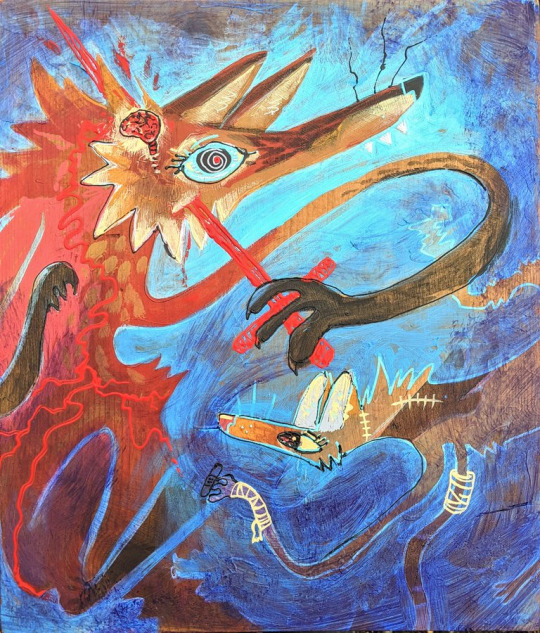
Researchers do not know for sure what causes PMDD or PMS. Hormonal changes throughout the menstrual cycle may play a role. A brain chemical called serotonin may also play a role in PMDD. Serotonin levels change throughout the menstrual cycle.
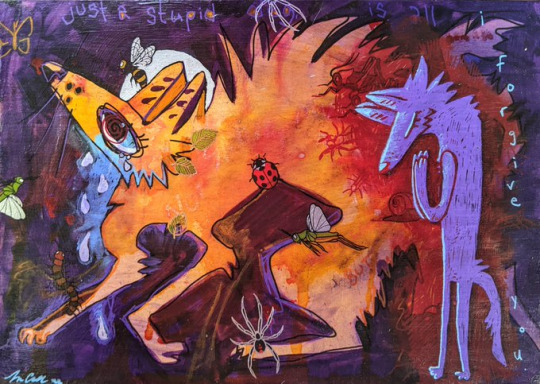
PMDD affects up to 5% of [menstruating people] of childbearing age. Many [people] with PMDD may also have anxiety or depression.

Treatments include: SSRIs, birth control pills, stress management.

Thanks for reading. ♥ I never see anyone mention this, I thought I'd say something.
Personal notes: I have found the supplement "Jubilance" (oxaloacetate) to be a huge help. Not a total fix, but a great relief. And therapy helps me a lot, too! Track your cycles, too!!
Source: https://womenshealth.gov/menstrual-cycle/premenstrual-syndrome/premenstrual-dysphoric-disorder-pmdd
#PMDD#post menstrual dysphoric disorder#mental health#reproductive health#art#artist#mcromwell#marandart#expressive art#menstruation#menstrating#tw periods#tw menstruation#long post
73 notes
·
View notes
Note
i saw your post about trans women getting periods, and as a transmasc guy that is super interesting to me. but where do you get cramps? like are they in the same area of where a uterus would be? or is it like back cramps? sorry if this is a dumb or insensitive question<3
that's not a dumb question at all. I'd be happy to answer. for those who don't know, trans women can go through PMS from taking estrogen. it doesn't happen to everyone though. I don't experience period cramps (it's mainly just headaches for me), but my trans friend who did get cramps described them in a very similar way to my cis friend who has periods. my trans friend describes the cramps on her sides and lower abdomen. but I would assume it's a little different for everyone.
also, as a follow up to the reblog I made from earlier. no, trans women do not literally get periods and bleed out their unterine wall. but they will experience all the symptoms and side effects and hormonal changes that causes periods. these symptoms are called PMS, or premenstrual syndrome (and yes, cis women can have PMS too). they can occur as changes in mood, anxiety, loss of sleep, and cramps. (I don't have cramps, but I do have some of the other symptoms)
calling these symptoms a "period" (while not technically the 100% accurate term) is still okay and understood by pretty much everyone familiar with trans women. I use "PMS" and "period" interchangeably
yeah, I hope that makes sense. if you would like, here's an article that goes into more detail than I could.
https://www.medicalnewstoday.com/articles/can-trans-women-get-periods
55 notes
·
View notes
Text

Embracing Self-Love: The Health Benefits of Female Self-Pleasure
In a world where open conversations about sexuality are increasingly encouraged, it's essential to recognize that self-love and self-pleasure play a significant role in a woman's overall well-being. While societal taboos have often shrouded the topic, it's time to shed light on the numerous health benefits of female self-pleasure.
Stress Relief
One of the most immediate and noticeable benefits of self-pleasure is stress relief. Engaging in self-pleasure triggers the release of endorphins and oxytocin, commonly known as "feel-good" hormones. These chemicals promote relaxation and reduce stress, helping women unwind after a long day.
Improved Sleep
For those struggling with sleep disorders or insomnia, self-pleasure can be a natural remedy. The release of endorphins during orgasm can induce a sense of calm and relaxation, making it easier to fall asleep and enjoy a restful night.
Enhanced Mood
Regular self-pleasure can help balance mood swings by regulating hormones. It's an effective way to combat anxiety and depression, fostering a sense of well-being and happiness.
Improved Pelvic Health
Engaging in self-pleasure helps strengthen the pelvic floor muscles, which can contribute to better bladder control and sexual satisfaction. lt can also reduce the risk of pelvic inflammatory diseases and urinary tract infections.
Increased Libido
Exploring one's body through self-pleasure can lead to a better understanding of one's desires and preferences. This increased self-awareness often translates into a higher libido
and more fulfilling sexual experiences with a partner.
Better Body lmage
Self-pleasure can promote a positive body image by fostering self-acceptance and self-love. It encourages women to embrace their bodies, which can lead to improved self-confidence in all aspects of life.
Hormonal Balance
Regular self-pleasure can help regulate hormonal fluctuations, particularly during the menstrual cycle. lt may reduce the severity of PMS (Premenstrual Syndrome) symptoms and create a smoother transition through the ups and downs of hormonal changes. By engaging in self-pleasure, women can potentially mitigate mood swings, irritability, and discomfort associated with hormonal fluctuations, allowing for a more harmonious and balanced emotional state throughout the month.
19 notes
·
View notes
Text


12/100 days of productivity • 05-11-23, Sunday
Today is for rest, reflection and rejuvenation. I was flicking through my old journal and founf this sage wisdom about anxiety and PMS (premenstrual syndrome). Probably a good time for the reminder! XD
Meeting about the GTR/Astro classes @12 noon
Learn German
Clean room
Go out. Get fresh air. Cycle around the campus. Get a burger.
Go to the doctor, get the cough checked
Cook dinner: Try cacio e pepe
I've missed my sleep cycle consistency in the past three days. I need to get it back on track again. I blame my coughs, which wakes my up at night and the cough syrup is making me drowsy in the morning and so I wake up late.
Tomorrow has an interesting thing coming up. Hopeful that it turns out good. Will update you all as soon as I get the information ❤️
#sunday vibes#weekend#dark academia#chaotic academia#gradblr#phd aesthetic#phd life#100 days of productivity#100 dop#productivity
13 notes
·
View notes
Text
Me, Myself and Progesterone
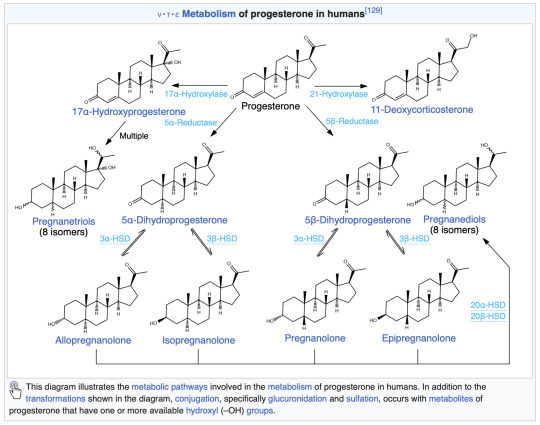
I touched on progesterone (P4) in my last transgender update post. I am not quite sure if progesterone is working in the way I want it to. My biggest annoyance with it is feeling like my brain is on fire just before trying to sleep.
Rewind to late February 2024, for almost three weeks my progesterone dose was doubled to 400 mg of oral, micronised, compounded progesterone – 200 mg twice a day. That’s up from the 200 mg once at night.
I had also ceased finasteride. And finasteride interferes with the progesterone (oral) pathway conversion to neurosteroids such as allopregnanolone. This is because finasteride blocks *most* of the activity (~70%) of the 5-alpha reductase (5AR) enzyme. In turn, reducing levels of allopregnanolone – or at least slowing their conversion to neurosteroids.
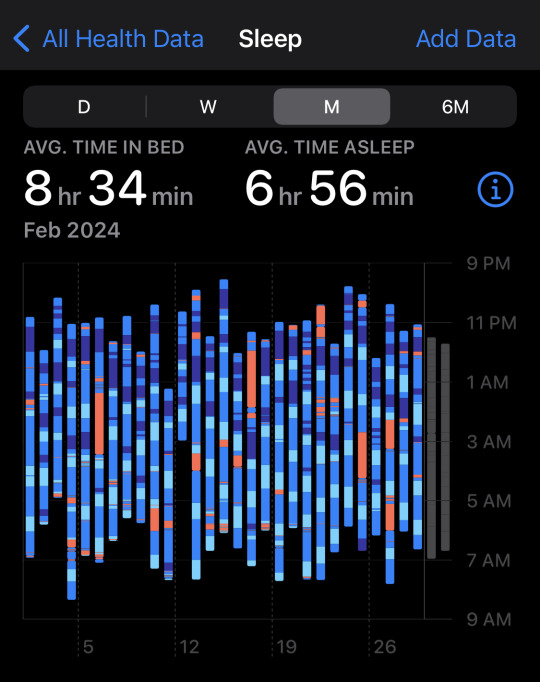
My sleep quality has been pretty broken for a while now. Look at those orange blocks. And here I was looking forward to some of the benefits from progesterone. Anxiolytic? Yes please! Sleep improving? Definitely!
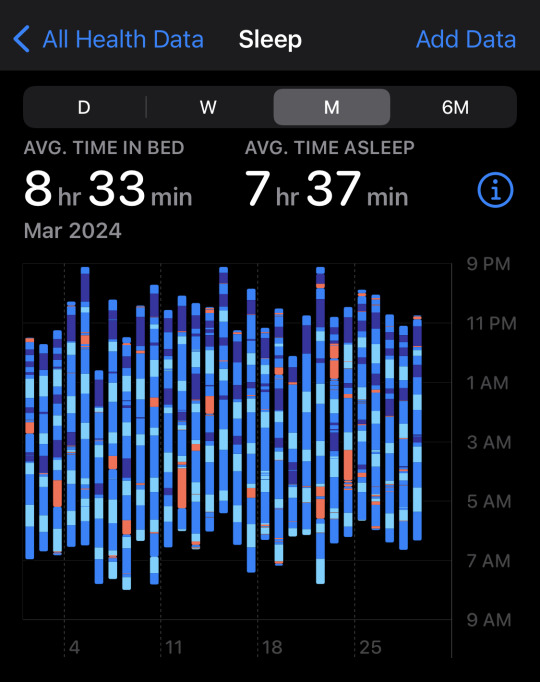
Instead I get this whole brain fire thing and feel like I’ve taken an anxiogenic. That got me thinking, brain on fire? Throw in some formication and it’s what feels like a glutamate rebound or surge. Excitotoxicity perhaps?
I’ve experienced similar feelings while withdrawing from pregabalin (decreases glutamate levels) and trusty old diazepam (increases GABA levels). Definitely that same feeling though. It appears that taking what I would consider a small dose (2 mg) of diazepam negates the insomnia pretty well. Even though diazepam isn’t a terribly good choice for sleep. It takes me from being a wired insomniac to sleeping beauty in about an hour.
Another interesting side effect I am seeing a lot more of is dissociation. Ordinarily, I would only experience this while in high stress, high anxiety situations but recently I’m noting it a lot more just doing chores around the house – which is a little concerning.
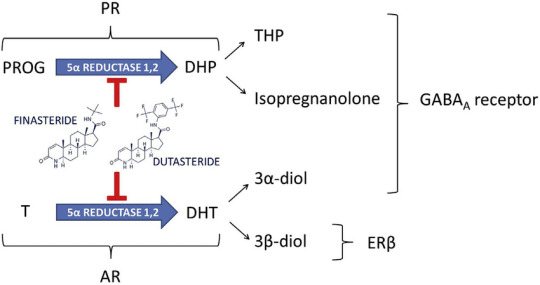
Regardless, it seems that something is messing with my GABAergic system and metabolites of progesterone fit the bill. Armed with my two-thirds of a biomedical science degree I went digging for more information on the metabolites. Up above is an image from my last health blog post. Note the action of finasteride on progesterone – blocking allopregnanolone (THP) and isopregnanolone.
I wonder if moving to a more potent 5AR blocker, such as dutasteride, would reduce the side effects of a higher dose of progesterone? A question for my endocrinologist I suppose. I restarted my finasteride to at least partially block some of the following progesterone metabolites. Let’s look at the metabolites a little closer and how they act.
Allopregnanolone (Tetrahydroprogesterone or THP)
Positive allosteric modulator
9 hours
Pregnanolone
Positive allosteric modulator
1 – 3.5 hours
Isopregnanolone
Negative allosteric modulator
14 hours
Targets allopregnanolone only
Epipregnanolone
Negative allosteric modulator
Half-life unknown
Alright, so a bunch of neurosteroids are doing a bunch of things. A few are being blocked, but also produce negative side effects when they weren’t blocked. Hormones are messy. Where does that leave me? I guess I am left questioning whether I should be taking progesterone at all. At minimum a dose reduction is definitely called for. I will probably return back to 200 mg and see what symptoms, if any, follow.
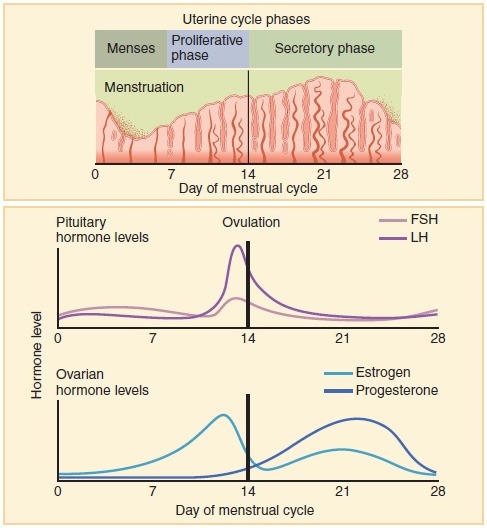
My search revealed some interesting data with overlap in symptoms shared with premenstrual syndrome (PMS) and premenstrual dysphoric disorder (PMDD) in cisgender women.
PMDD is believed to be caused by fluctuations in gonadal sex hormones or variations in sensitivity to sex hormones.
If sensitivity to level shifts is reason for the negative side effects, then single or even twice daily doses are probably not enough to smooth out the levels of neurosteroids for me, allowing me enter a withdrawal state, perhaps? Brain on fire? This paper offers some great insight into the mechanisms behind it all with some interesting side notes on SSRIs.
Interestingly, SSRIs increase allopregnanolone levels in the brain, rapidly and at low doses, as demonstrated in rodents as well as in patients with depression.
Could this be one of the reasons why I can’t tolerate SSRI/SNRIs? At the very least, it’s some food for thought. Worth noting that the original study has been questioned a little further along in the paper. Let’s circle back to those progesterone levels again. From Wikipedia
Progesterone levels tend to be less than 2 ng/mL prior to ovulation and greater than 5 ng/mL after ovulation.
What were my most recent levels again? 9.1 nmol/L or should I say 2.6 ng/mL (freedom units). That’s at 200 mg once daily at night, measured in the trough. I really need to ask myself, do I want to have symptoms of PMS/PMDD? Is that even a question that needs to be asked?
Looking at the levels on Table 1 in this paper give an idea where my levels line up. If you factor in the short half-life of most of the metabolites, once daily dosing is probably a bad idea. Ideally, I should look into getting the dose split to 100 mg twice daily.
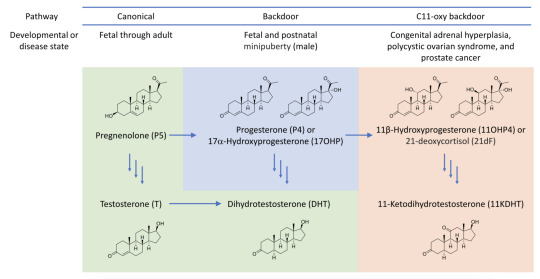
Of course I have to be mindful of negative risk such as the androgen backdoor pathway. This has the potential to generate unwanted androgens like DHT – which will affect the hair on my head. That’s why the finasteride is here to stay until most means of testosterone generation is removed from my system…
It’s not all bad though. Finasteride competes with progesterone for the 5AR enzyme – which results in even less 5AR being available for testosterone -> DHT conversion. Another point worth considering is that progesterone has a positive effect on bone-building cells (osteoblasts). This can help with avoiding or reducing effects of osteoporosis.
Touching on side effects I’ve noticed, Progesterone should increase libido. Which is something I do not want due to past trauma. However, I wonder if the finasteride side effects are at play here. Again, I don’t consider them negative side effects either.
Other oddities I’ve also noticed my facial hair has become darker at the higher progesterone dosing at 400 mg. My upper lip now has dark black hairs, that’s new and unwanted. It might be useful for IPL treatment. But now there’s shadow on my upper lip I never had before. It isn’t just the thinning of skin either. The hairs are black instead of blonde.
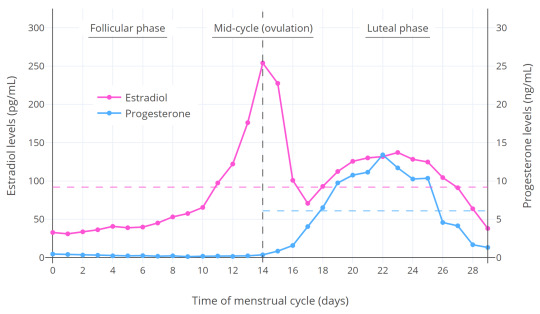
One big uncertainty is that I’m not sure what my levels of estradiol will be at the next blood test. Are the 200 mg of pellets doing their job properly? Or did they fail? Does the dose need to be increased?
For now, I’ve been supplementing the implant with the remainder of my 2 mg estradiol pills while the pellets stabilise. One pill gives me ~85 pmol/L in estradiol levels. I’ve only just ran out of those so now I’m adding in some of the estradiol gel (Sandrena branded). These gave ~200 pmol/L estradiol per dose according to my most recent blood tests. In theory with one a day, I should be guaranteed to be in the late follicular phase – regardless of the implant levels.
Anyway, that was one heck of an info dump. I think that sums everything up that has been on my mind lately.
TL;DR
400 mg oral progesterone makes my brain go on fire. Progesterone metabolite levels shifting around are very activating for me. I will now target cisgender progesterone levels in the late follicular phase. Hormones are complicated. One size fits most seems to be at play when it comes to progesterone. Nothing like some trial and error! 🙃
#transgender#transfem#trans#lgbtq#queer#progesterone#estrogen#GAHT#HRT#allopregnanolone#pregabalin#diazepam#GABA#finasteride#PMS#PMDD#GABAergic#brain on fire#fire brain#brainly fires#firely braining
2 notes
·
View notes
Text
Fluoxetine (Prozac)
I've been on Fluoxetine for a few years now and have recently had my dosage doubled so here's an info post. The words highlighted in green are what personally effects me.
Some eating disorders and mood disorders may be treated with fluoxetine. Insomnia is more likely to occur than drowsiness. The serotonin syndrome may occur if you take fluoxetine with other medications that also release serotonin, such as tramadol, or if you overdose on fluoxetine.
Anxiety and Stress, Major Depressive Disorder, Bulimia, Depression, Premenstrual Dysphoric Disorder, Obsessive Compulsive Disorder, Panic Disorder, Postpartum Depression, Schizoaffective Disorder, Binge Eating Disorder, Agoraphobia, Body Dysmorphic Disorder, Borderline Personality Disorder, Dissociative Identity Disorder, Dysautonomia, Excoriation Disorder, Fibromyalgia, Hot Flashes, Intermittent Explosive Disorder, PANDAS Syndrome, Persistent Depressive Disorder, Premature Ejaculation, Somatoform Pain Disorder, Trichotillomania, Vulvodynia are some of the conditions this medication is used to treat.
Fluoxetine is an SSRI.
Side Effects
The most common side effects reported are; insomnia, asthenia (fatigue), and headaches.
Very Common
Headache
Somnolence (drowsiness, or the desire to sleep)
Tremor
Dizziness
Insomnia
Anxiety
Nervousness
Nausea
Diarrhea
Dry Mouth
Rhinitis (runny or itchy nose, sneezing)
Pharyngitis (sore throat)
Yawning
Asthenia (fatigue)
Anorexia
Decreased Sex Drive
Flu Syndrome
Common
Amnesia
Hyperkinesia (restlessness)
Paresthesia (a burning/prickling/numb/tingling/itching sensation that occurs on the hands, arms, legs, or feet, ect.)
Change of Taste
Abnormal Dreams
Agitation
Difficulty Paying Attention
Unstable Emotions
Hostility
Hypermania
Mania
Abnormal Thinking
Abdominal Pain
Constipation
Indigestion
Gassy-ness
Vomiting
Nosebleeds
Ear Pain
Fever
Thirst
Tinnitus
Decreased or Increased Appetite
Weight Loss
Painful Period Cramps
Erectile Dysfunction
Trouble cumming
Increased Need to Urinate
Hypertension
Abnormal Heartbeat
Rash
Sweating
Itchy Skin
Abnormal or Blurred Vision
Muscle Twitching
9 notes
·
View notes
Text
The neuroprotective qualities of licorice have led to research into its positive impact on learning and memory, anxiety, and depression. In animal models, it has been shown to interact with GABA, dopamine, serotonin, norepinephrine, and sex hormone receptors. Glabridin, the most plentiful isoflavone in licorice, crosses the blood-brain barrier and may be partly responsible for these activities. Because of its anti-inflammatory action, licorice is thought to have potential to be protective against Alzheimer's disease.
Potential adverse effects of licorice are in line with its hypermineralocorticoid-like effects. They include hypertension, hypokalemia, and fluid retention, with increased blood levels of sodium and decreased potassium. The researchers discuss the case of one woman who died following several months of high-dose licorice root. Suspicion that her death was caused by mineralocorticoid action was not supported by blood tests, which found only trace amounts of glycyrrhetic acid. Patients with mineralocorticoid syndromes have been reported to consume variable amounts of licorice, from 1.5 grams daily to 250 grams daily. Other individual factors may be involved in susceptibility to side effects. For example, the authors state that licorice may increase water retention in women with premenstrual syndrome.
#currently.. i am needing to learn about plant medicine#my doctors keep giving me TCM and i know too little about it#and don't want to take it long term lacking knowledge#plant medicine#innko reads
8 notes
·
View notes
Text
Ayurveda , Doctor , Treatment , Nadi Pariksha , Medicine , Pure Herbs , Sri Sri Tattva , The Art of Living ,Sudarshan Kriya , Yoga , Meditation

Sri Sri Tattva Nadi Pariksha
youtube
“Ayurveda” is being recognized as a holistic system of medicine, Which holds that the body is the foundation of all Wisdom and Source of all Supreme Objectives of life.Ayurveda” have effective treatment for, Asthma, Mental Tension , Spinal Disorders , High blood pressure ,
Mental Stress, Spondylosis , High Cholesterol , Fatigue , Obesity , Headaches , Respiratory Problems , Heart Diseases , Migraine , Gastric Complaints , Chest Pain , Arthritis , Weight Loss , Osteoarthritis , Body Purification , Gynecological Disorders , Rheumatism , Anti-ageing , Chronic Constipation , Speech Disorders , Piles , Back Pain , Nervous Disorders , Hair Loss , Gout , Premature Graying , Skin Diseases , Psoriasis , Insomnia , Memory Loss , Pain , Gastric Problems , Immunity Problems , Anemia , Acne , Anorexia , Anxiety , Acidity , Bronchitis, Diabetes , Dyspepsia , Dysentery , Dandruff , Depression , Diarrhea , Dengue , Chikungunya , Indigestion , Urinary bladder disorder , Fungal infection , Nasal Congestion , Gum and Tooth diseases , Vitiation of blood , Burning Sensation , Oedema , Emaciation , Impotency , Inflammation , Ulcer , Thirst , Chloasma of face , Tastelessness , Pleurodria , Intercostal neuralgia , Pthisis , Vitiation of semen , Sciatica , Filariasis , Tumour , Intermittent fever , Lassitude , Hoarseness of voice , Mole , Conjunctivitis , Glaucoma , Myopia , Repeated Abortion , Duodenal ulcer , Malabsorption syndrome ,
youtube
Eczema , Flatulence , Fever , General Debility , Irregular Menstrual Cycle , Jaundice , Hepatitis , joint Pain , Kidney stone , Leucorrhea , Leukoderma ,
Liver Disorder , Menopause , Premenstrual Tension , Pyorrhea , Peptic Ulcer ,
Palpitation , Rheumatism , Ringworm , Stress Management , Sinusitis , Sore Throat , Skin Allergy , Sciatica , Sleeplessness ,Toothache , weight ,
Urinary Diseases , Vertigo , infection , Restlessness , Hypertension ,
Malarial Fever , Cough , Cold , Pimples , Black Heads , Appetite problem , Vomit , Eye problems , Abdominal fever , Abdominal lump ,
Swelling , Fibroid , Cyst , Bleeding , Infertility in men and women ,
Pneumonia , Curing Dryness , wounds, cuts, & burns .
Consult a certified Doctor for more details on Ayurvedic Treatment.
youtube
Sri Sri Tattva Ayurvedic Proprietary Medicine , Single Herbs and Classical Medicine at Glance to Promote Health and Wellness
NAOQ19
AMLAPITTARI VATI ,
AMRUTADI VATI ,
ANCHOLEAN TABLETS,
ATISARAHARA VATI ,
DEVA VATI ,
IMMUGEN TABLETS,
JANTUGHNA VATI ,
JVARA KEERTI VATI ,
KASAHARA VATI ,
LIV-ON TABLETS,
MAMATVA GRANULES ,
MEHANTAKA VATI ,
NARAYANA KALPA TABLET ,
NAVAHRIDAYA KALPA TABLETS,
OORJA FORTE TABLETS,
OORJA TABLET ,
OSPO-C TABLETS ,
PAVANAHARA VATI ,
PITTA BALANCE GRANULES ,
PRADARASHAMAKA VATI ,
PRANADA GUTIKA ,
PRATISHYAYAHARA VATI ,
PYLMUKTI OINTMENT ,
PYLMUKTI TABLET ,
QUICK HEAL CREAM ,
RAKTASHODHINI VATI ,
RAKTAVARDHINI TABLET ,
RAKTAVARDHINI SYRUP ,
SANDHIMITRA VATI ,
SHIRASHOOLARI VATI ,
SHWASA SHUDDHI VATI ,
TWAQURE OINTMENT ,
VEDANANTAKA BALM ,
VEDANANTAKA LINIMENT ,
VEDANANTAKA VATI ,
VIRECHANA VATI ,
VRIKKA SANJIVANI VATI ,
VITILWEL OINTMENT ,
VITILWEL TABLETS ,
AMLA TABLETS ,
AMRUTH TABLETS ,
ARJUNA TABLETS ,
ASHWAGANDHA TABLETS ,
ASHWAGANDHADI TABLETS ,
BRAHMI TABLETS ,
CHANDRAPRABHA VATI ,
CHITRAKADI GUTIKA TABLETS ,
DHATRI LAUH TABLETS ,
HARITAKI TABLETS ,
KAMADUDHA RASA TABLETS ,
KAPIKACCHU GRANULES ,
LAVANGADI VATI ,
NAVAYASA LAUHA TABLETS ,
NEEM TABLETS ,
NISHAMALAKI TABLETS ,
RASNADI VATI ,
SAPTHAMRUTH LAUHA TABLETS ,
SHATAVARI TABLETS ,
SHILAJIT LAUHA VATI ,
SUDARSHAN VATI ,
TRIPHALA TABLET ,
TULASI TABLET ,
VYAGHRYADI TABLET ,
YASHTIMADHU TABLET ,
GOKSHURADI GUGGULU ,
KANCHANARA GUGGULU ,
MAHAYOGRAJ GUGGULU ,
TRAYODASHANGA GUGGULU ,
AVIPATTIKARA CHURNA ,
HARIDRA KHANDA ,
HINGVASTAKA CHURNA ,
PAVANHARA CHURNA ,
SITOPALADI CHURNA ,
TALISADI CHURNA ,
TRIPHALA CHURNA ,
BRAHMA RASAYANA ,
CHITRAKAHARITAKI LEHYA ,
KUSHMANDA RASAYANA ,
NASYA NASAL INHALER ,
SRINETRA STERILE EYE DROPS,
SUDANTA TOOTH DROPS ,
KASAHARI COUGH SYRUP ,
MEDHYA RASAYANA SYRUP ,
PACHANI RASAYANA SYRUP ,
PRADARASHAMAKA SYRUP ,
RAKTASHODHINI ARISHTA ,
SARIVA SYRUP ,
USHIRA SYRUP ,
MAHATRIPHALADYA GHRITA ,
PHALASARPI ,
GOMUTRA ARKA ,
GULMAHARA ARKA ,
ORGANIC AJAMODA ARKA ,
ORGANIC TULASI ARKA,
SANDHIMITRA ARKA,
SHAKTI DROPS,
VRIKKA SANJIVANI ARKA ,
ANU TAILA,
KSHIRABALA TAILA,
NARAYANA TAILA,
PINDA TAILA,
SHISHU TAILA ,
OJASVITA RAGI,
PRADARSHAMAKA VATI,
ALOE VERA JUICE ,
AMLA JUICE,
ALOE VERA TRIPHALA JUICE,
KARELA JAMUN JUICE
KABASURA KUDINEER TABLETS,
KABASURA KUDINEER CHOORNAM ,
TURMERIC PLUS TABLETS ,
GILOY JUICE ,
GILOY TULASI JUICE
AYUSH KWATH TABLETS ,
SUDANTA TABS ,
AYUKANTI LEHYAM ,
OJASVITA GOLDEN LATTICE .
KALAMEGH TABLETS ,
AYUSH - 64 ,
SHANKHPUSHPI TABLETS ,
SUKESHA KALPA TABLETS ,
SUKESHA HAIR VITALISER CREAM ,
Giloy juice
Giloy Tulasi Juice
CHYAWANPRASH ,
ALMOND OIL VEG CAPSULE ,
EVENING PRIMROSE OIL VEG CAPSULE ,
FENUGREEK OIL VEG CAPSULE ,
FLAXSEED OIL VEG CAPSULE ,
GARLIC OIL VEG CAPSULE ,
NIGELLA OIL VEG CAPSULE ,
WHEAT GERM OIL VEG CAPSULE ,
APPLE CIDER VINEGAR JUICE ,
WHEATGRASS JUICE ,
MOORINGA JUICE ,
RAW NONI JUICE ,
Brahmi Vati Suvarnayukta
Bruhat Vata Chintamani Rasa
Mahalaxmivilas Rasa
Shwaskas Chintamani Rasa
Sootashekhar Rasa ( Gold)
Suvarna Vasant Malati
Vasant Kusumakar Rasa
Yogendra Rasa
#Rejuvenate yourself with Ayurveda and Yoga Campaign#Ayurveda#Doctor#Treatment#Nadi Pariksha#Medicine#Pure Herbs#Sudarshan Kriya#Youtube
2 notes
·
View notes